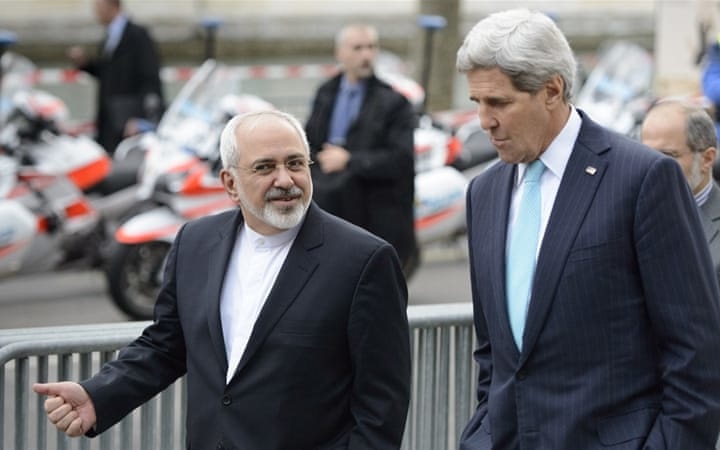Iranian Foreign Secretary Mohammad Javad Zarif and US Secretary of State John Kerry walk towards a nuclear agreement in 2015 (EPA)
Co-written with Professor David Dunn for the Birmingham Brief:
The current crisis between Iran and the US demonstrates the challenges of developing trust in international politics, four years after the two countries — along with the UK, France, Germany, and China — reached a breakthrough agreement over Tehran’s nuclear deal.
Since 1979, the Islamic Republic has been seen as a revolutionary force in the international system. For most of this period, the major Western states sought to contain rather than engage with Tehran, but the development of Iran’s nuclear program impelled the Obama administration to initiate a process of diplomatic outreach.
This outreach culminated in the signing of the July 2015 nuclear deal which sought to limit Iran’s uranium enrichment capability – crucial to any eventual production of nuclear weapons. Although US and international sanctions played an important role in bringing about the agreement, trust also played its part with the personal bond between US Secretary of State John Kerry and his Iranian counterpart Mohammad Javad Zarif.
Iran Daily, August 1: Trump Administration Sanctions Foreign Minister Zarif
Kerry and Zarif depended for their success on the trust placed in them by their political bosses, President Barack Obama and President Hassan Rouhani. The agreement was aimed at extending trust beyond this narrow group of US and Iranian decision-makers to their successors and to bureaucracies on both sides. The process was multilateral with the other 5+1 Powers (France, Germany, the UK, Russia, and China) essential to mitigating the residual legacy of distrust between Tehran and Washington.
While the agreement has been successful since 2015 in constraining Iran’s enrichment and other nuclear capabilities, neither the US nor Iranian governments believe that the other side has lived up to the spirit of the agreement.
The Iranians trusted in the US promise to implement the sanctions relief in the Joint Comprehensive Plan of Action, but this has not been forthcoming. Instead, Obama’s successor Donald Trump has unilaterally abandoned the deal and imposed the toughest sanctions regime to date. By preventing third parties from having any financial or commercial dealings with Tehran, the Administration has sought to strangle the Iranian economy in the belief that this will compel Iran into a new negotiation, one that heavily favors American security interests.
This episode demonstrates two challenges to building trust in international politics. The first is the ability to sustain that trust at a time of transition in domestic politics. Writing in 1959, international relations theorist John Herz asked how state leaders can “trust in the continuance of good intentions in the case of collective entities with leaders and policies forever changing”. Herz’s gloomy answer was that uncertainty about future intentions compels state leaders to hedge against the “worst”.
It is a conclusion that will find a sympathetic ear among Iranian decision makers. Rouhani and Zarif have come under increasing pressure from hardliners who have challenged the wisdom of constraining Iran’s nuclear capabilities – which are short of The Bomb – at a time when North Korea is being feted by Trump because of its nuclear weapon status.
The second aspect of the dilemma is the extent to which trustworthiness can be expected beyond specific areas of agreement. Iran interpreted the deal as recognition of its status as a regional great power that had an important stake in security in the Middle East. Iranian leaders have not seen a contradiction – and hence a failure of their trustworthiness – between agreeing nuclear constraints while continuing ballistic missile development and sponsoring co-religionist militant forces in Syria, Yemen, Iraq, and Lebanon. The Trump Administration, especially National Security Advisor John Bolton, and other hawks, have viewed Iran’s perceived “adventurism” as a breach of trust and evidence of bad faith.
The mutual perception of a betrayal of trust is a challenge to de-escalation of the current crisis in the Persian Gulf. Iran’s actions against tankers demonstrates Tehran’s belief that the only way it can make progress with the Trump administration is through a strategy of “controlled escalation” — bumping against the US strategy of “maximum pressure” on the Islamic Republic.
The interaction of these strategies, combined with a lack of concerted diplomatic engagement, makes it difficult to see how trust can be re-established. Given the importance of interpersonal trust in reaching agreement in the first place, a new opportunity to build trust may only come when there are leaders on both sides who are committed to empathizing with the security concerns of the other.


“reached a breakthrough agreement over Tehran’s nuclear deal”
When do the liberal bleeding hearts want to understand. It was not a “breakthrough” agreement. It was appeasement and that’s why we are here. Trump only accelerated the inevitable.
These bleeding hearts can’t wait to get a chance to reinstate the same inadequate deal. The same bleeding hearts that are mute when it comes to human right abuses of iri all over the place. The same bleeding hearts that don’t want to slow down the flow of mercedes, bmw and porsche to the bloody hands of murderers of iran. So, yes, I am supporter of trump not because I think he is good president, but because he has disrupted your blind and inept bleeding heart.